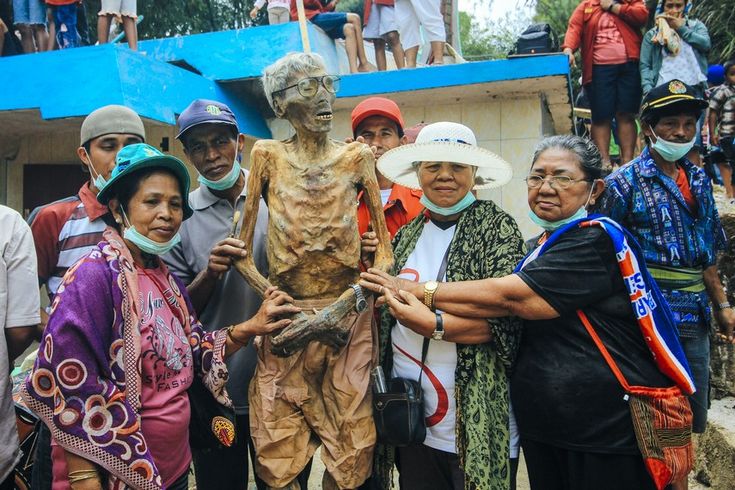
In the lush highlands of Toraja, South Sulawesi, Indonesia, the boundary between life and death is not a sharp line—it’s a sacred bridge that families cross again and again. And nowhere is that more evident than in Ma’Nene, one of the most fascinating and misunderstood rituals in the world.
What is Ma’Nene?
Ma’Nene, often referred to as “The Ceremony of Cleaning Corpses,” is a centuries-old tradition where Torajan families exhume the bodies of their deceased loved ones, carefully clean their remains, and then dress them in fresh clothes.
It’s not a horror story. It’s an act of deep love, honor, and connection—a way for the living to maintain ties with their ancestors long after they’ve passed.
Why Do the Torajans Perform This Ritual?
In Torajan belief, death is not an ending—it’s a transition. The deceased are not gone, but rather, they continue to live in another realm, watching over their families.
Ma’Nene is performed to:
- Show respect and gratitude to ancestors
- Reconnect spiritually with loved ones
- Maintain harmony between the living and the dead
- Bless the future of the family through ancestral presence
For the Torajans, a body is not something to fear, but something sacred. Ma’Nene is not mourning—it’s a reunion.
When and Where Does Ma’Nene Take Place?
The ritual is usually held once every few years, mostly during August or September, depending on the family’s schedule and financial readiness. The ceremony is common in Baruppu and Pangala districts in North Toraja.
It begins with prayers and offerings. Then, family members carefully open the tombs, gently lift the bodies, clean them, dress them, and sometimes walk them around the village for a symbolic “visit home.”
What to Expect as a Visitor
If you’re lucky enough to witness Ma’Nene, prepare to see:
- Open stone graves carved into cliffs
- Mummies dressed in modern clothes—shirts, sunglasses, even sneakers
- Families smiling, talking to, and taking photos with their loved ones
- A celebratory atmosphere that contrasts the Western concept of grief
📸 Travel Tip: Always ask for permission before taking photos. Be respectful—it’s a sacred family affair, not a tourist performance.
Is It Safe? And Ethical?
Yes, Ma’Nene is safe. The highlands’ cool climate helps preserve the bodies, and locals use natural herbs during burial that prevent decay. However, visitors should always:
- Be respectful of the ritual and its meaning
- Dress modestly
- Go with a local guide who understands the traditions
- Never touch or disturb the remains
Final Thoughts
Ma’Nene is not about death—it’s about connection, memory, and legacy. In a world where we often fear or avoid discussions of mortality, Toraja offers a profound reminder:
The dead never truly leave us. They live on—in memory, in ritual, and in love.
If you’re seeking a travel experience that touches the soul, not just the senses, witnessing Ma’Nene might just change the way you see life… and death.
🧭 Planning a Trip to Toraja?
Looking for a guided tour or cultural experience in Toraja? Check out our curated Toraja journey packages and start your unforgettable adventure today.
Related: Learn about the Rambu Solo funeral ceremony → rambu solo toraja
